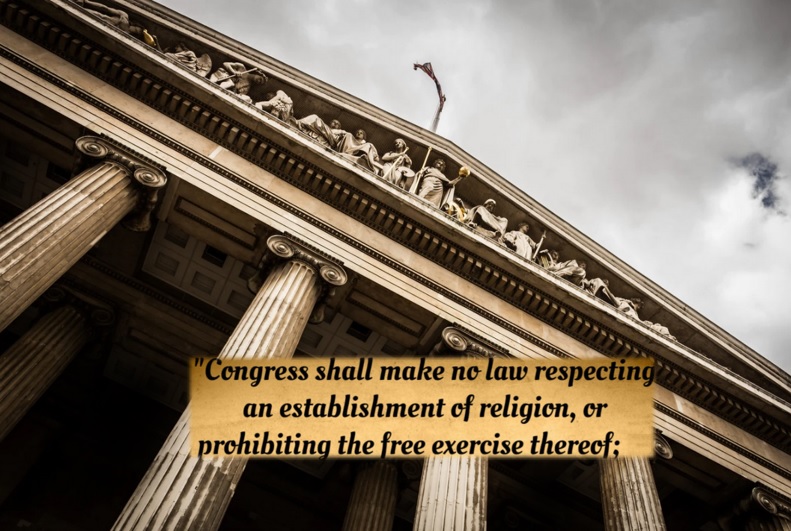
By Liberty Counsel,
After years of judicial activists eradicating religious monuments and expressions of faith on public property because of the “Lemon Test,” major victories at the U.S. Supreme Court last year that led to the overturning of the legal test have changed the landscape in America.
The “Lemon Test” was binding authority for 51 years with 7,073 references in court opinions, administrative law decisions or other legal writings as cited on Thomas Reuters Westlaw. The legal test came out of the ruling in Lemon v. Kurtzman that has been used to determine if a law violates the First Amendment Establishment Clause. The High Court ruled in that case that a Rhode Island law that supplemented salaries of some parochial schoolteachers was unconstitutional.
As a result, Lemon has been used by courts to remove religious symbols and displays from the public square since 1971. In fact, Justice Antonin Scalia, joined by Justice Clarence Thomas, wrote in Lamb’s Chapel v. Ctr. Moriches Union Free School District regarding that the High Court’s invocation of the “Lemon Test” was “like some ghoul in a late night horror movie that repeatedly sits up in its grave and shuffles abroad, after being repeatedly killed and buried.”
However, all that changed last year as a result of two major victories at the U.S. Supreme Court.
On May 2, 2022, Liberty Counsel’s 9-0 victory at the U.S. Supreme Court in Shurtleff v. City of Boston involved censorship of Christian viewpoints regarding flag raisings. The High Court unanimously ruled that the city of Boston violated the Constitution by censoring a private flag in a public forum open to “all applicants” merely because the application referred to it as a “Christian flag.” The High Court unanimously rejected Boston’s use of the “Lemon Test” to censor Christian viewpoints.
In Kennedy v. Bremerton School District, Liberty Counsel argued in its amicus brief that since the Establishment Clause provides no justification for suppressing Coach Joe Kennedy’s private, religious speech to silently pray on the football field after games, the “Lemon Test” should be overruled. Then on June 27, 2022, the High Court ruled 6-3 in favor of the high school football coach and also finally buried the court-made “Lemon” test, citing Liberty Counsel’s 9-0 decision handed down in Shurtleff v. City of Boston involving the Christian flag.
The Kennedy ruling stated, “This Court long ago abandoned Lemon and its endorsement test offshoot… In place of Lemon and the endorsement test, this Court has instructed that the Establishment Clause must be interpreted by ‘reference to historical practices and understandings.'”
As a result, the Ten Commandments, for example, can be displayed on government property, including in public school classrooms. That means that the 1980 Stone v. Graham Supreme Court decision is no longer valid. In this case, the High Court ruled that a Kentucky law requiring the posting of a copy of the Ten Commandments, purchased with private contributions, on the wall of each public school classroom was unconstitutional and violated the first part of the Lemon and the Establishment Clause of the Constitution.
The activist 5-4 per curium opinion in Stone v. Graham was issued without any briefing or oral argument. Incredibly, the Court wrote:
“If the posted copies of the Ten Commandments are to have any effect at all, it will be to induce the schoolchildren to read, meditate upon, perhaps to venerate and obey, the Commandments. However desirable this might be as a matter of private devotion, it is not a permissible state objective under the Establishment Clause.”
However, since Lemon has been finally buried, students across the nation can read, memorize and hopefully obey, the Ten Commandments. Now it would be nice to return to the time prior to the removal of the Ten Commandments from schools when the worst infractions were chewing gum and spitballs.
In addition, other religious symbols such as crosses can permanently remain on government property.
On June 20, 2019, even though the U.S. Supreme Court ruled that the Bladensburg Peace Cross, a 40-foot cross honoring those who died during World War I, could remain standing, the High Court sidestepped the opportunity to overturn the “Lemon Test.” Liberty Counsel filed an amicus brief to the High Court in support of the 93-year-old war memorial in Bladensburg, Maryland that the American Humanist Association challenged as violating the Establishment Clause and “discriminating against patriotic soldiers who are not Christian.”
Since the “Lemon Test” is now dead and the Establishment Clause must be interpreted according to its historical intent, all the cases that relied on Lemon are no longer valid, including cases that struck down Ten Commandment displays, Nativity scenes or other religious symbols. In fact, Justice Sonia Sotomayor dissenting in Kennedy v. Bremerton School District, wrote: “The Court overrules Lemon v. Kurtzman and calls into question decades of subsequent precedents that it deems ‘offshoot[s]’ of that decision.”
Liberty Counsel’s Founder and Chairman Mat Staver said, “The decisions from the Supreme Court involving the Christian flag and Coach Kennedy send a clear message that the ‘Lemon Test’ has finally been buried and government must not discriminate based on religious viewpoint. The Ten Commandments, Nativity scenes, crosses, religious symbols, displays, expression, meetings, and performances can no longer be brushed aside. No longer can courts divorce America from religious freedom or the First Amendment from its original and historical purpose.”
Liberty Counsel provides broadcast quality TV interviews via Hi-Def Skype and LTN at no cost.
Disclaimer: Articles featured on Oregon Report are the creation, responsibility and opinion of the authoring individual or organization which is featured at the top of every article.

